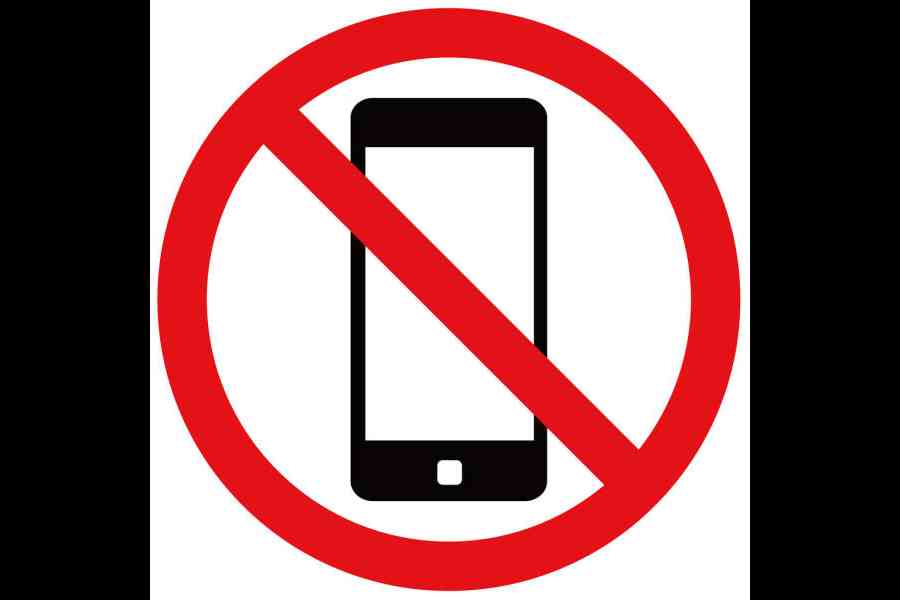All Phones Down


Nearly every student clutches a phone in one hand while traversing the University of Central Florida campus in the US, even when walking in groups. Laptops and tablets are lunchtime companions, and earbuds and headphones are routine accessories. While waiting for class to start, many students sit in silence, drawn into their devices.
It is a familiar and exasperating scene for Seán Killingsworth, 22, a former UCF student. “What is this life I’m signing up for?” he asked himself during his sophomore year. “It was just like I’m talking to a bunch of zombies.”
Killingsworth craved a space where he could chat with his peers without feeling as if he was intruding. When he was in high school, he ran into similar conundrums, so he would organise phone-free hangouts with friends.
Why not in college too? In 2023, he helped bring the idea of no-phone social time to two different Florida campuses — UCF in Orlando and Rollins College in Winter Park. He called it the Reconnect Movement. During meetings, everyone was required to hand over their phone and socialise without devices. Reconnect has now spread to six schools in four states. And in September it broadened its reach beyond students, hosting a phone-free event in New York City — soon to be followed by events in Orlando and Tampa — that anyone could attend.
Reconnect’s popularity dovetails with a cultural shift in how smartphones and social media are perceived by adults and adolescents alike.

Experts have sounded the alarm about the potential mental health dangers of digital media, even though it’s hard to prove a causal connection between this technology and the rising rates of loneliness, anxiety and depression in young people. Campaigns to reduce or delay smartphone use like “Wait Until 8th” and books like Jonathan Haidt’s bestselling The Anxious Generation have struck a deep chord, particularly with parents. Meanwhile, new laws are popping up countrywide to ban phones at public schools.
Student-led movements have often encouraged phone abstinence but the Reconnect Movement doesn’t push students to change their relationship with technology. It aims to create what Killingsworth called “human connection habitats” that eliminate the need for willpower.
The idea isn’t particularly novel, Killingsworth said, but novel isn’t what his generation needs. “Gen Z needs a normal that we’ve never experienced,” he said.
On a recent sticky afternoon, nearly 40 students gathered at the UCF campus arboretum for the first Reconnect meeting of the fall semester. After surrendering their devices to a “phone valet”, they sat cross-legged on patchwork blankets and prepared to spend one hour without screens.
As a CD player belted out reggae music from the band Stick Figure, many of the students began to make eye contact and small talk. You would be forgiven for thinking you had been transported back 20 years.
Students can feel uncomfortable at the start of a meeting, said Mia Shaffner, 20, the UCF club president. Phones act as a “digital pacifier”, she said, and her peers tend to scroll when they feel uneasy. But by the end, she added, they realise that talking is “not really as difficult as they think it is”. Sometimes Reconnect participants gather for a hike followed by a cookout. Other times they create art together or meditate. Today, they would just talk.
At one point, Killingsworth was compulsively looking at his phone. And social media comparisons left him feeling defeated. “Snapchat made me more self-conscious about my appearance than I’d ever been before,” he said. Instagram, where he would watch clips of fellow skateboarders doing crazy tricks, made him feel like he didn’t measure up.
So he deleted social media and has since switched to a flip phone after deciding that the smartphone prevented him from living his life “in a happy way”. During a speech last fall in Weyers Cave, Virginia, hosted by The Campus Suicide Prevention Center of Virginia, Killingsworth warned that phones “weaken and destroy” social ecosystems and called Generation Z’s social environment a “wasteland”.
But scholars like psychologist Candice L. Odgers have questioned whether digital media is the boogeyman that it is often made out to be.
When asked for their opinion on the matter, teenagers report that they enjoy taking breaks from their devices. A 2023 study from the Pew Research Center found that about three-quarters of teens felt happy or peaceful when they didn’t have their smartphone. Even so, more than 40 per cent admitted that when they didn’t have their phones, it sometimes made them feel anxious, upset and lonely.
Once everyone has set aside their phones at Reconnect meetups though, that anxiety tended to lessen.
By the end of next year, he said, 11 more Reconnect chapters should be up and running, a list that includes high schools, colleges and cities. But while interest in Reconnect has been spreading, the idea of a phone-free club is still too big an ask for some students.
NYTNS